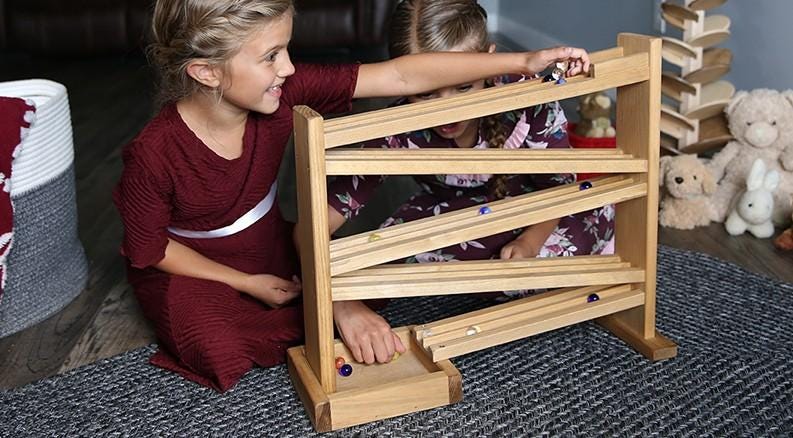#106 Should Teens Work More?
Teen employment is at an all-time low as high schoolers focus on college aspirations. But are today's kids missing the most important lessons?
For most of human history, this has been a noncontroversial topic as people relied on children to help with the farm, family business, or household maintenance to survive.
However informal, the idea of “getting an education” was mostly reserved for the upper class.
Even when people moved from farms to cities during the Industrial Revolution, kids continued to find work to pitch in at home. Some crawled into salt and copper mines, while others took to the assembly lines. Both would have been OSHA nightmares, to say the least.
But as life became easier for Americans throughout the 20th century, working at a young age became more of a means to buy a Playstation and socialize than survival, as adolescents gained employment at grocery stores, movie theaters, and restaurants.
But the trend has been on the decline.
As we approached the turn of the century, social pressure to go to college discouraged kids from working, especially if money wasn’t an issue.
For context, teen employment steadily remained around 50% during the 70s, 80s, and 90s but has dwindled to 35% today, dipping down to 28.1% when the lockdowns hit.

As economic concerns have grown over the last few years, particularly with college graduates finding more debt than a pot of gold at the end of the academic rainbow, people of all ages are asking if hyper-focusing on college is the right path.
Is it time young people prioritize work opportunities over highfalutin promises of riches offered by higher learning?
Argument: Kids Need an Education, not a Paycheck!

Sure, kids used to work on farms and factories, but we’re civilized now. To be successful these days, one must get a college education.
You have to stay in school. You have to. You have to go to college. You have to get your degree. Because that's the one thing people can't take away from you is your education. And it is worth the investment. -Michelle Obama
Main Points Against Teen Employment
Educational interference
Child exploitation
Childhood and social development impact
Physical and mental health concerns
Negative social prioritization
Point #1: Educational Interference
Kids already have enough on their plates between spending most of the day in class, participating in extracurricular activities, doing homework, and dealing with the stresses of being teenagers.
Working will hamper their ability to keep grades high enough to get into a good school.
A study from Temple University shows that kids who work more than 20 hours a week see a significant drop in academic performance.
Point #2: Child Exploitation
Employers take advantage of younger people by assigning work outside their job description or skimping on pay where possible.
Not to mention, the world is more dangerous today.
When minors work in restaurants, retail, or theaters, they also become exposed to other threats, such as sexual harassment. Even traveling to and from a job alone at night presents safety concerns.
Point #3: Childhood and Social Development Impact
Maintaining a busy schedule with school and work affects young people’s ability to build meaningful relationships with their peers.
We have our whole lives to work, and we should allow young people to have fun and develop social skills as much as possible.
Working in a busy restaurant might seem like an excellent opportunity to meet others, but using a job as a social hour instead of taking the work seriously could lead to disciplinary issues and reputational damage.
Point #4: Physical and Mental Health Concerns
The additional stress of bussing tables or sweeping up popcorn, combined with school expectations and general adolescence, can negatively impact physical and mental well-being.
Any extra time from school or homework should be spent at home with family or friends, ideally in an active outdoor setting, instead of doing menial labor for low wages.
Point #5: Negative Social Prioritization
Again, we have our whole lives to stress over finances. Advocates for teen employment tend to set the expectation that money is everything.
Teenagers today should spend time exploring their interests to determine what they want to be when they grow up instead of securing a paycheck.
Rebuttal: Get a job, Kid!

While most modern professionals have a college degree, this is usually due to social expectations rather than necessity.
Kids should get a basic education, but we mustn’t forget the lessons learned on the clock.
The youth need to be enabled to become job generators from job seekers. -Abdul Kalam
Main Points for Teen Employment
Development of skills, responsibility, and work ethic
Financial independence and contribution
Preparation for the real world
Delinquency reduction
Entrepreneurial inspiration
Point #1: Development of Skills, Responsibility, and Work Ethic
You might wonder what valuable skills teens can learn by working a drive-thru or delivering papers at the crack of dawn. If they still do that.
But it’s not always the work itself that provides value. Learning to work with others and understanding essential responsibilities such as time management are necessary lifetime lessons.
Accomplishing daily goals and earning a paycheck also serve as a building block for developing the self-esteem and personal encouragement needed for a strong work ethic.
Point #2: Financial Independence and Contribution
We don’t encourage younger people to work because money is the most critical thing in life, but to learn how money works.
Sure, kids can learn the fundamentals in a business math class, but there’s nothing like having a job to teach kids the meaning of trading their time and skills for money.
With a steady paycheck, kids learn how taxes work and how to manage money. Most banks offer checking accounts, debit cards, and bank app access for minors to learn the basics.
Point #3: Preparation for the “Real World”
Most teens know only home and school life. They might play sports or participate in extracurricular activities, but most haven’t been exposed to people outside their peer groups.
Working a Joe job exposes kids to leadership outside these realms, and they begin to understand that they will not always be under their parents' and teachers' wings.
Also, working at a restaurant or retail store teaches young folks to interact with people of all ages and backgrounds, improving their social skills.
Point #4: Delinquency Reduction
We all know idle hands do the devil’s work. Kids get into trouble because they’re bored after school, on weekends, and during summer breaks.
Depending on who kids work with, there can be an opposite effect, but if they find a positive work environment, they generally have less time for questionable activities.
Point #5: Entrepreneurial Inspiration
People always ask teens what they want to be when they grow up, and many have no clue. Introduction to the workforce may spark interest in young minds, especially when working for a local or regional entrepreneur.
Employment isn't just about taking orders from managers.
After working with people for a while, kids can get to know business owners or company management and learn how they got to their positions. If teens find positive mentorship through employment, it could encourage them to open their own businesses someday.
Skip the BIGGIE Debt! Get BIGGIE Paid!
What do John D. Rockefeller, Henry Ford, Hitler, Mussolini, Oprah, Mark Zuckerberg, Steve Jobs, Bill Gates, and Dave Thomas have in common?
Aspirations for world dominance?
Not Dave Thomas, the only one on this list I’d trust. But then again, who knows what to believe these days? Wendy’s dad could have been a mob enforcer for all we know. Have you tried my BIGGIE cement shoes?
These people all share a common trait: they never went to college.
Hitler tried to enroll in art school but was denied. Twice. I bet they regretted that decision.
But hate ‘em or love ‘em, these people were or are successful, at least for a time, whether their victories came in the form of genocide, triple stacks and fries, or internet censorship-and they didn’t need a degree.
Of course, a basic education is essential, and higher learning is necessary for fields that require a formal education, such as science and medicine.
But modern kids are missing out on valuable lessons offered only through employment because school administrators, parents, and society force them down a restricted path to “success.”
That’s why I propose we look more into high school co-op programs.
My high school had a co-op program in which students were shipped off to a designated workplace for a few hours daily for pay and school credit. Often, they worked another shift after school.
Unfortunately, they weren’t exactly considered the cool kids.
But after graduation, while the rest of us rushed into a pit of debt to learn about things we would never apply in life, co-op students began making money and likely went off to start their own businesses.
However, these attitudes might change.
Hordes of young people have taken to social media in recent years to share their horror stories of entering the workforce with tons of student loan debt and few job opportunities.
Still, one can work in high school and get into a decent school if needed. Trade schools and community colleges are great. People are just worried about social branding.
Either way, I think people in the future will regard hyper-focusing on college prep rather than working the same way we do with sending ten-year-olds into the salt mines or off to assembly lines to make toys with lead paint.
A thorough knowledge of the Bible is worth more than a college education.-Theodore Roosevelt
Meme of the Week

Brand of the Week: Amish Toybox
Larry Kauffman and his wife Bethann started Amish Toy Box in 2010 as a side hustle before turning their hobby into a full-time gig.
These Amish-inspired products, from toys to dollhouses to games, are built to last and made right here in the USA.
No cheap Chinese garbage here.
Head over to AmishToyBox.com and check it out today!
American of the Week: Police Officer Jeremy R. Labonte
Officer Jeremy Labonte responded to a suspicious person's call at a shopping center on February 7th.
Upon arriving, he approached the suspect for questioning, at which point the mysterious man pulled a gun and began firing at Officer Labonte and fled. As EMS transported the wounded officer to the hospital, his teammates apprehended the shooter.
Unfortunately, that would be Jeremy’s last watch.
Jeremy had served with the Roswell Police Department for over three years. He is survived by his wife, parents, two sisters, nephew, and grandparents. He was only 24 years old. Remember Jeremy today.








Love the article!